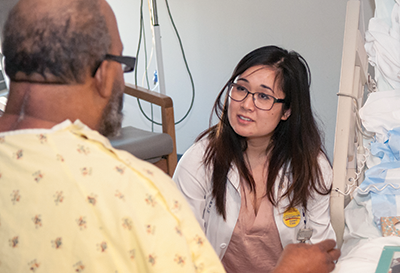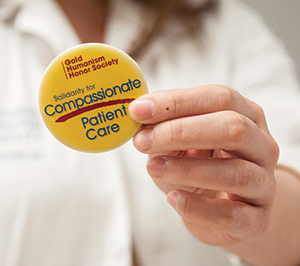“Tell Me More,” Say Third- and Fourth-Year M.D. Program Students to Patients During National Gold Humanism Honor Society Solidarity Day
Fourth-year medical student Sarah de los Santos slowly enters the warmly lit patient room at George Washington University Hospital. “Hi, my name is Sarah. Today is a very special day,” she tells a patient in a wheelchair, adding, “it’s what we call Solidarity Day.”

Feb. 13 marked the fourth annual celebration of the national Gold Humanism Honor Society’s (GHHS’s) Solidarity Day for Compassionate Care. Typically held on or near Valentine’s Day since 2011, Solidarity Day has been a time to show support for the importance of kindness to patients. The day also highlights a nationwide movement promoting provider–patient relationships based on caring, personalization, and mutual respect. The national event gained momentum after New Jersey Senators Cory Booker and Robert Menendez and Illinois Senator Mark Kirk successfully sponsored a resolution in 2013 and 2014 to officially recognize Solidarity Day.
In the past, the George Washington University School of Medicine and Health Sciences (SMHS) chapter of GHHS handed out gold “humanism” wristbands. This year, SMHS students joined with GHHS chapters from across the country to participate in the “Tell Me More” program. Originally developed by the Mount Sinai Icahn School of Medicine GHHS chapter, the program helps to personalize patients for the students, the physicians, the nurses, and anyone else entering their hospital rooms. SMHS students spent time with patients, asking a few basic questions about their personal lives, such as: How would your friends and family describe you? What are you most proud of? What is your favorite sports team? What are you looking forward to most once you leave the hospital? What is your favorite place to visit? Afterward, they wrote down one or two of those responses and displayed them over the patients’ beds.

“Chapters nationwide celebrate Solidarity Day through various activities,” says fourth-year SMHS medical student and GW GHHS member Sarah Zader, who managed this year’s event, with the help of fellow fourth-year SMHS medical student Utsha Khatri-Chhetri. “Our chapter really liked the Tell Me More program and thought it would truly be a meaningful and interactive way to enhance patient care, so that was what we decided to do for Solidarity Day.”
In the hospital, she adds, patients sometimes lose their sense of self. They become a disease or a diagnosis rather than the holder of a unique collection of qualities that make them individuals. “Today, your mission is to discover these qualities of our patients and share them with others involved in patient care,” Zader told the group of participating third- and fourth-year medical students before they fanned out among the hospital wards. “Our goal is to help our patients regain their sense of selfhood during their hospitalization.”
Zader adds, “The whole point of this exercise is to get to know the patients as people, not a collection of diseases. I love this part of medicine.”
“People might ask, ‘Why is understanding the patient story so important?’” says Suhavi Tucker, a third-year medical student at SMHS. “I think the answer lies in improving that reciprocal, doctor–patient relationship. Patients and physicians need to see each other as humans. Knowing the patient’s story is important to understanding who they are, what their values are. It helps us as doctors to build trust with our patients and deliver better care. It helps to establish a more honest relationship.”
She adds, “I hope I never lose the sense of excitement and joy I felt today.”



